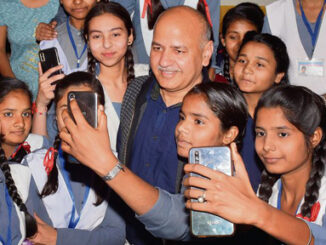
Policymakers would do well to maintain the steep rise in capital expenditure
“The new government, thus, has an enormous task ahead as it prepares the Budget, even though GDP growth has reached moderately high levels over the past two years. It needs to ensure that growth is inclusive so that all segments of society can reap the benefits. The recent elections have shown that aspirations are rising all over the country. Social welfare policies are clearly welcome in the short term, but they must make way for sustainable development in the long run.”

The first Budget of the new government is being prepared in the backdrop of continuing tensions in the geopolitical arena. The Russia-Ukraine war and the Israel-Hamas conflict show no signs of abating. The domestic economy may be growing in a sustained manner at around 8 per cent, but the outlook may alter, depending on the stability of the external environment. Finance Minister Nirmala Sitharaman must be hoping that global oil prices would remain subdued and that Western economies emerge from recessionary trends that have affected export growth. Keeping international ocean lanes free from strife will also be critical to avoiding an undue rise in costs of inbound or outbound trade. Clearly, the external headwinds have the potential of playing spoilsport with the India growth story. It is, therefore, essential that the Budget keep the focus on strengthening key sectors like infrastructure and services while supporting agriculture and the rural economy in equal measure. Social welfare policies are clearly welcome in the short term, but they must make way for sustainable development in the long run.
On the infrastructure front, policymakers would do well to maintain the steep rise in capital expenditure recorded over the past few years. The 2024-25 Interim Budget scaled down the earlier 30 per cent rise in capex to about 16.9 per cent, but a higher increase is warranted, given the vast infrastructure gap in the country. Though this may not create a huge number of skilled jobs immediately, it will undoubtedly have a long-term impact on employment creation. The fact that the Reserve Bank of India has transferred Rs 2.11 lakh crore to the Central Government exchequer gives it considerable cushion to continue in this direction during the current fiscal as well.
The Budget will also need to move towards creating an easier climate for private investment, which has been lagging behind the public sector. While policies already in place — such as the production-linked incentive schemes — will give a boost to manufacturing, procedures need to be further streamlined. The regulatory environment has certainly come a long way since the 1991 economic reforms. But comparisons with the past are no longer relevant. Comparisons now need to be made with other emerging economies. Countries like Vietnam and Indonesia are offering simpler and easier investment regimes, an attraction for multinationals to set up base there. India, in contrast, is not looking so appealing.
Domestic investors have to contend with higher capital and logistics costs. Yet, the main hurdle for both domestic and foreign investors remains the plethora of clearances needed to set up new projects. These issues are now largely at the level of the states or even local municipalities. Bringing the ease of doing business down to this level needs to be part of next-generation reforms.
An indication that this is already being considered lies in the economic statement issued with the 2024-25 Interim Budget in February. It referred to improving governance at the block, district and village levels. A one-time loan to states, amounting to Rs 75,000 crore, was also offered for growth and development-oriented reforms. The focus areas were identified as health, education, skilling and land acquisition.
The only snag in this plan is that not all states will cooperate despite the availability of loans to carry out reforms. BJP-ruled states are bound to comply with directives from the Centre, but the same response may not be forthcoming from other states. The aim of kickstarting next-generation reforms may, thus, be only partially successful. At the same time, some states, especially in the southern region, already seem to have streamlined regulatory processes. The result is that investors are making a beeline for them. For instance, tech giants like Apple and Microsoft are locating new projects primarily in Tamil Nadu, Karnataka and Andhra Pradesh. Policies adopted by these states need to be studied and replicated in others.
In this context, budgetary provisions need to be made for the critical segment of education and skilling. While job creation is bound to be high on the government agenda, the fact is that many sectors are facing a shortage of skilled personnel. There is also a mismatch between the type of education and the specific skills needed by industry. Long-term policy prescriptions should be formulated to resolve this issue but, in the short run, the upcoming Budget can provide adequate allocations for skilling institutes.
In addition, education needs to be given greater attention. This is a country with excellent higher education institutes like the IITs and IIMs, but primary and secondary education are in a dismal state. Here, too, the Centre and the states need to work together to ensure that our large, youthful population is well equipped to enter the workforce.
The Finance Ministry also needs to give more support to services like travel and tourism, both in terms of their contribution to the GDP as well as employment creation. The hospitality industry is seeking infrastructure status for hotels to enable it to access better financing options and attract more investment. This sector is rebounding strongly from the Covid-induced collapse, but some targeted support would expand employment opportunities.
As for the agricultural policy, there is an urgent need to establish agro-linked industries in rural areas. Along with incentives to set them up, systems are needed to be established so that farmers can access retail markets in a more direct way. The creation of more income generation avenues as well as basic infrastructure in rural areas must be taken up on an urgent basis. Otherwise, the urban-rural divide will continue to widen in the coming years.
The new government, thus, has an enormous task ahead as it prepares the Budget, even though GDP growth has reached moderately high levels over the past two years. It needs to ensure that growth is inclusive so that all segments of society can reap the benefits. The recent elections have shown that aspirations are rising all over the country. Social welfare policies are clearly welcome in the short term, but they must make way for sustainable development in the long run.
(The author is a Senior Financial Journalist)





Be the first to comment